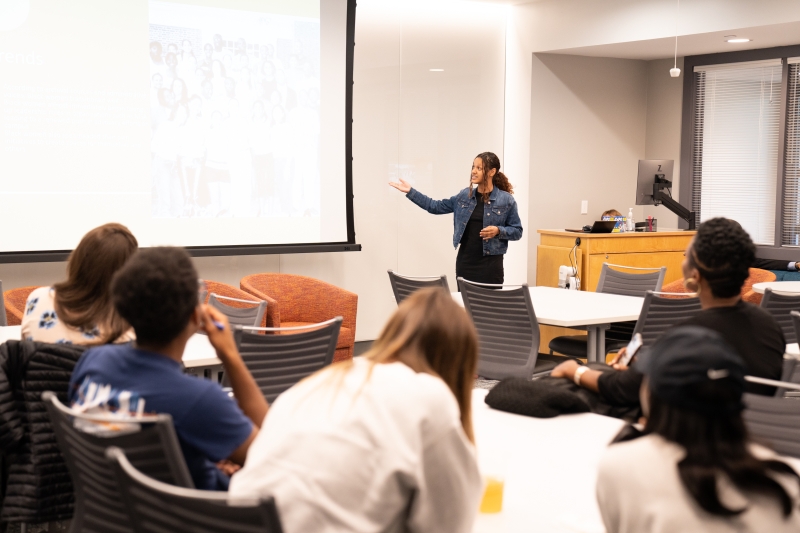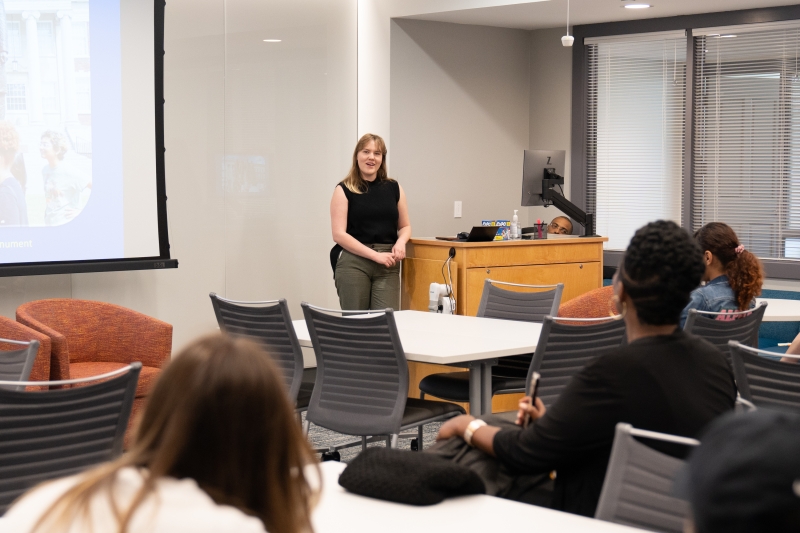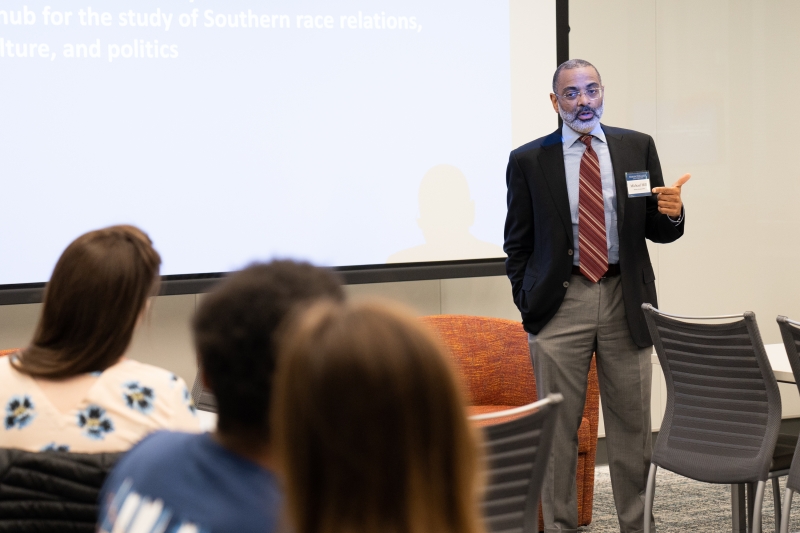W&L’s DeLaney Center Launches Research Project on Black Women and Desegregation The DeLaney Center’s latest research project connects current students with a rich legacy.
“When students examine primary sources and generate interview questions, they take steps that customize their academic growth. I’m thrilled that the DeLaney Center can provide such opportunities.”
~ Michael Hill, director of the DeLaney Center
On Thursday, May 4, the university community was invited to an afternoon tea in Elrod Commons to hear updates from the DeLaney Center that included findings from its latest project, a student-led research initiative that is unearthing stories from underrepresented voices in W&L’s history.
The DeLaney Center, the university’s newest interdisciplinary academic center, launched its “Black Women and Desegregation” project during the 2022-2023 academic year in coordination with the Office of Institutional History and University Library. The project seeks to create opportunities for researchers and scholars, along with current and future students, to learn about the college experiences of Black women in the first 30 years of coeducation at W&L through archival research and oral history.
“W&L prioritizes active learning,” said Michael Hill, director of the DeLaney Center and professor and chair of the Africana Studies program. “When students examine primary sources and generate interview questions, they take steps that customize their academic growth. I’m thrilled that the DeLaney Center can provide such opportunities.”
Amber Morrison ’23 presented findings from the group’s work during Winter Term 2023 at the DeLaney Center’s afternoon event, offered as part of the university’s Spring Alumni Weekend schedule.
“We can learn a lot about the times we are examining by talking to the people who actually lived through them,” Morrison said. “Through conducting interviews, both with current and past administrators and alumni, my hope at the end of this project is to create a cohesive narrative about the experience of Black women over time that future students can build from.”
Morrison, Marlee Davis ’25, Madison Karlin ’25, Niani Benjamin ’24 and Tiwaniya Tyler ’24 formed the inaugural research cohort. The group worked with Rose Hein ’22, the DeLaney Center’s postbaccalaureate fellow, to gather information from the university’s archives and prepare for interviews with alumnae. The project will continue next year with a similarly sized student cohort. Hein said her role in the project is to support student researchers.
“Although past researchers have done a lot of work to tell the stories of students who made history as they integrated and coeducated the university, that work is far from done, and there is a gap in that research,” Hein said. “Black women, who first entered the university as undergraduate students with its 1985 coeducation, make up a unique group whose experiences differ from the histories previously told. We want to record and share those stories.”
Davis, who is an English major, said the opportunity to participate in an oral history research project was as rooted in her academic pursuits as it was in a desire to connect with the experiences of other Black women who have made an impact on W&L’s campus.
“My interest lies the African American literary tradition and the importance of oral history in that tradition, almost as its own literary canon,” Davis said.
Washington and Lee officially desegregated its undergraduate student body in 1972 and began admitting women in 1985. Researchers began conducting background research before embarking on an ongoing oral history project involving recording the voices and experiences of Black women who were present as W&L students at various points in the university’s history.
Hein said the DeLaney Center seeks to prepare students for their future careers by building interpersonal and communication skills, teaching concrete research methods, and establishing relationships between current students and alumni.
“It has been a wonderful experience to see these students discover and think about the past through their own present lenses,” Hein said, referring to the research cohort. “Current undergraduate students really know student life at this university, and their insights are vital when it comes to learning about the history of that student life.”
Morrison serves on the executive leadership team of the Student Association for Black Unity (SABU) and previously worked on a project through Institutional History documenting the integration of Black students into the undergraduate campus from 1971 to 1985. She said she believes the DeLaney Center project has expanded her understanding of student leadership and the impact that it has on society.
“No matter how small the action, the dedication to making our communities better — even in the face of hardship — is exactly what America needs if it hopes to be a more prosperous and inclusive country,” Morrison said.
Hill said that those interested in participating in or following the progress of the project should keep an eye on the DeLaney Center’s web presence for updates.
“The Black Women and Desegregation project launched during the current academic year,” Hill said, “but it is an ongoing enterprise.”
 Amber Morrison ’23 presents research findings in Elrod 216.
Amber Morrison ’23 presents research findings in Elrod 216. Rose Hein ’22, the DeLaney Center’s first post-Baccalaureate fellow, gives an overview of the project.
Rose Hein ’22, the DeLaney Center’s first post-Baccalaureate fellow, gives an overview of the project. Michael Hill updated attendees on the DeLaney Center’s current and future initiatives.
Michael Hill updated attendees on the DeLaney Center’s current and future initiatives.
You must be logged in to post a comment.